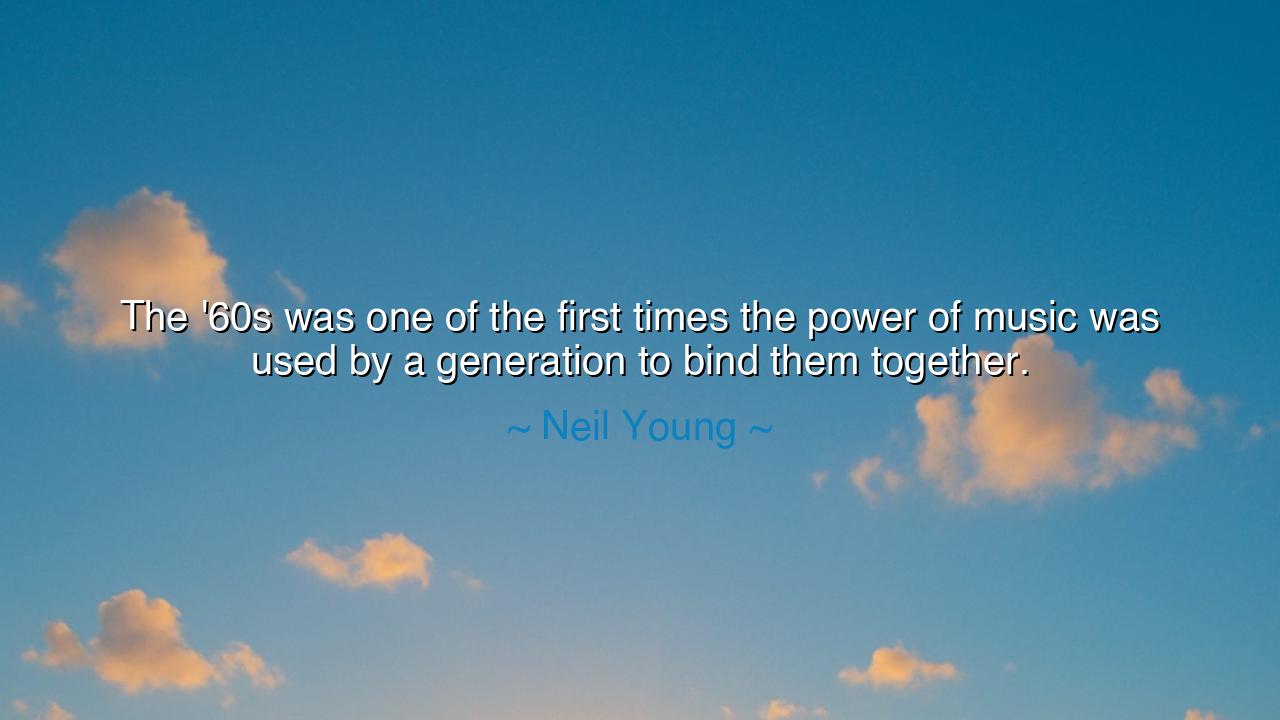
The '60s was one of the first times the power of music was used
The '60s was one of the first times the power of music was used by a generation to bind them together.






Hear the words of Neil Young, troubadour of truth and voice of restless souls: “The ’60s was one of the first times the power of music was used by a generation to bind them together.” In this reflection lies the memory of a stormy age, when the young lifted their voices not only to sing but to unite. For music, in that sacred decade, became more than entertainment—it became a banner, a shield, a torch carried into the darkness of war, injustice, and change.
To speak of the power of music is to acknowledge that it can move more than the heart; it can move entire peoples. In the 1960s, a generation burdened by the weight of war in Vietnam, by civil rights struggles, by questions of freedom and authority, found in song a way to weave themselves into one voice. A single guitar strummed at a protest, a chorus rising in harmony, became more powerful than speeches alone. Music bound the scattered into a movement, transforming individuals into a generation.
Consider Bob Dylan, whose songs like “Blowin’ in the Wind” and “The Times They Are A-Changin’” became hymns of protest and hope. His music was not polished spectacle but raw poetry set to melody, giving words to the questions burning in millions of young hearts. When crowds sang these songs together, they were no longer separate—they were bound by common purpose, carried forward by music’s unifying force.
Or recall Woodstock in 1969, when half a million souls gathered in fields, not under banners of nations or leaders, but under the rhythm of guitars and drums. There, the music itself was the law and the language, dissolving divisions and binding strangers into community. For those few days, the world witnessed what Neil Young describes: a generation bound together by the unseen threads of sound and spirit.
The meaning of Young’s words is this: the ’60s revealed that music is not only personal expression but communal power. It can shape movements, inspire courage, and create belonging where there was once isolation. Music speaks across boundaries of race, class, and creed, because it bypasses the intellect and strikes directly at the soul. And when an entire generation sings the same songs, they become a chorus too strong to be ignored.
The lesson for us today is clear: do not underestimate the unifying force of art. In times of division, music can remind us of our shared humanity. In times of despair, it can awaken hope. If you feel alone, seek the songs that speak your heart, and you will find others who share your journey. If you feel powerless, remember that history itself has been turned by the sound of voices raised together in song.
And what must you do, O seeker? Listen to the music of your time not only for pleasure but for meaning. Share songs that inspire justice, peace, and unity. If you create, let your art bind people together, not tear them apart. For though armies march and empires rise and fall, it is music that carries the memory of generations. The ’60s proved this truth, but it is a truth that belongs to all ages.
Thus, let Neil Young’s words echo in your spirit: music has the power to bind generations together. Carry this forward into your own life. Let the rhythm of song remind you that you are not alone, but part of a larger chorus—one that began long before you and will continue long after, weaving humanity together in the eternal harmony of hope.






AAdministratorAdministrator
Welcome, honored guests. Please leave a comment, we will respond soon